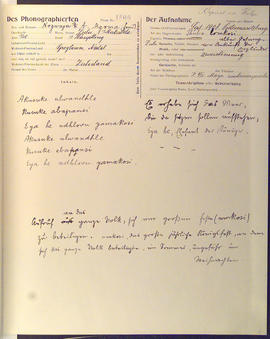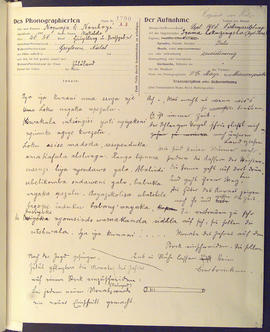- Ph1762A-1762B, OEAW PHA CD 25/1:3
- Unidad documental simple
- 2016 -
Parte deFHYA curation of selected materials from the Phonogrammarchiv at the Austrian Academy of Sciences
CD numbering, recommendations for citation
[Source - The Collection of Father Franz Mayr Zulu Recordings 1908, CD booklet, 2006: Each series has a single CD number, which is independent of the actual number of CDs comprising the series. For example, a series may be listed as OEAW PHA CD 9. The third CD of this series will be listed as OEAW PHA CD 9/3. Due to the short playing time of a Phonogramm, a single CD may contain up to 40 tracks. We recommend citing the historical recordings according to the following guidelines: In the first instance, each recording should be referred to by its catalogue number (e.g. Ph 628, G 3412). If a recording is taken from the present edition, the catalogue number should be followed by the CD number of the relevant series (if a series comprises several CDs, the CD number should be followed by the CD sub-number, separated from the CD number by a slash), and by its particular track number, set apart by a colon; e.g. Prayers: Ph 1753, OEAW PHA CD 25/1: 1. !hub° lempi (war [dance] song): Ph 1759, OEAW PHA CD 25/2]

![Hymn Descants, sung by the same girls [as in Ph 1761; accompanied by a reed organ], handwritten p...](/uploads/r/austrian-academy-of-sciences-oaw/8/1/1/8111917636b3bb54fd93a460b591fcb288311d5399aaf993b962760cda167dea/OAW_Mayr_1908_The_Collection_of_Father_Franz_Mayr_Zulu_Recordings_handwritten_protocol_Ph_1762A-1762B_142.jpg)
![Hymn Descants, sung by the same girls [as in Ph 1761; accompanied by a reed organ], music notation](/uploads/r/austrian-academy-of-sciences-oaw/b/1/d/b1d25828814813b710a99f442a3b6df1eeed3d303cdfee5e04d710f84565fa8b/OAW_Mayr_1908_The_Collection_of_Father_Franz_Mayr_Zulu_Recordings_music_notation_Ph_1762A-1762B_142.jpg)

![Lomtshado, Iketo: old song [bridegroom's party] Two-part singing by Nogwaja and Nomhoyi, handwrit...](/uploads/r/austrian-academy-of-sciences-oaw/c/c/e/cce3e99acf57c489df044e58ba65c967c5a9da8e8b87938899fa50195ae6312e/OAW_Mayr_1908_The_Collection_of_Father_Franz_Mayr_Zulu_Recordings_handwritten_protocol_Ph_1805_142.jpg)

![lgama lokusina kwomakoti ekupeleni kwomtshado: wedding song [wedding dance (...?)] Sung by Maria ...](/uploads/r/austrian-academy-of-sciences-oaw/9/f/a/9fa6e275895ca62b56269ec52adc624a7ce76074c8dcf269b4d32eab9627cb04/OAW_Mayr_1908_The_Collection_of_Father_Franz_Mayr_Zulu_Recordings_handwritten_protocol_Ph_1802_142.jpg)

![Isigexhe samadoda [quick wedding dance combined with hand clapping (-?)] Two-part singing by D. M...](/uploads/r/austrian-academy-of-sciences-oaw/2/8/9/289a4917e061e731e38855f682755d7e465dcd9dc10d53b4332e7ea84b95275e/OAW_Mayr_1908_The_Collection_of_Father_Franz_Mayr_Zulu_Recordings_handwritten_protocol_Ph_1798_142.jpg)
![Igama lokubonga inyama yesifuba: [dance (...?)], with laughing and shouting Two-part singing by D...](/uploads/r/austrian-academy-of-sciences-oaw/d/2/6/d26e37c813db2ab8ab3883ec3a842b1bc89e6b2e1c5f700fc3d0981756844d83/OAW_Mayr_1908_The_Collection_of_Father_Franz_Mayr_Zulu_Recordings_handwritten_protocol_Ph_1797_142.jpg)
![Igama lokwendisa [engagement dance] Two-part singing by Frida Kunene and Maria Theresa Kanyile, h...](/uploads/r/austrian-academy-of-sciences-oaw/c/0/5/c05d6db7433ce91fb21e8e7702669dcccfde34579f140c79e90eb0c4a9c906e1/OAW_Mayr_1908_The_Collection_of_Father_Franz_Mayr_Zulu_Recordings_handwritten_protocol_Ph_1796A-1796B_142.jpg)
![lgama lokusina [wedding dance] Two-part singing by Maria Theresa Kanyile and D. Mdhlalose Ph 1795...](/uploads/r/austrian-academy-of-sciences-oaw/9/a/e/9ae0dd405552389e2597067cfb6dd53d31d78bf56d56bfcf31a49c50d7795daf/OAW_Mayr_1908_The_Collection_of_Father_Franz_Mayr_Zulu_Recordings_handwritten_protocol_Ph_1795B_continuation_of_missing_Ph_1795A_p50_142.jpg)
![Ihubo lenkosi (Umqundane): chieftain's song [addressed to chieftain Umqundane] Sung by Pakati, ha...](/uploads/r/austrian-academy-of-sciences-oaw/9/0/b/90bab7f6bb703fe3d24b3d7254b9c1c5cf7d2f1848379afe345d0d67603aaba3/OAW_Mayr_1908_The_Collection_of_Father_Franz_Mayr_Zulu_Recordings_handwritten_protocol_Ph_1792_142.jpg)
![Ihubo lenkosi (Umqundane): chieftain's song [addressed to chieftain Umqundanex] Sung by Pakati, h...](/uploads/r/austrian-academy-of-sciences-oaw/9/f/0/9f08759ba3f6a22fcfd072125c52ee8530a0447c4c74daf6a56af3c5ea14f6e5/OAW_Mayr_1908_The_Collection_of_Father_Franz_Mayr_Zulu_Recordings_handwritten_protocol_Ph_1791_142.jpg)

![Ihubo lokuzingela [hunting song] Two-part singing by Nogwaja and Nomhoyi, handwritten protocol](/uploads/r/austrian-academy-of-sciences-oaw/6/a/2/6a2da75198d0e60fddd3cd79f5103ed0d0b0c80a5454b0c4400c3bc767d2103d/OAW_Mayr_1908_The_Collection_of_Father_Franz_Mayr_Zulu_Recordings_handwritten_protocol_Ph_1789_142.jpg)
![Ihubo lokucela impi: song to pray for war Sung by [Maria] Gertrude Mkize, handwritten protocol](/uploads/r/austrian-academy-of-sciences-oaw/b/c/f/bcf2ccf168b01d336afc751a2affa52b63275a385bd406c0dbbb49b81ead60fc/OAW_Mayr_1908_The_Collection_of_Father_Franz_Mayr_Zulu_Recordings_handwritten_protocol_Ph_1787A-1787B_142.jpg)
![Ihubo lenkosi lokudumisa inkosi: chieftain's song [...?] Sung by Pakati, handwritten protocol](/uploads/r/austrian-academy-of-sciences-oaw/6/b/9/6b9cec795d97c2a9f442d738ed067920cb205744626a0c3162ee9dd42372bb37/OAW_Mayr_1908_The_Collection_of_Father_Franz_Mayr_Zulu_Recordings_handwritten_protocol_Ph_1786_142.jpg)
![Ihubo lempi: old war song [war-dance song] Sung by Pakati, handwritten protocol](/uploads/r/austrian-academy-of-sciences-oaw/0/d/4/0d49f1d626f5f64b5bc7513fa4185503d3b8b8fcd43fd6470ec701d862ef2616/OAW_Mayr_1908_The_Collection_of_Father_Franz_Mayr_Zulu_Recordings_handwritten_protocol_Ph_1785_142.jpg)

